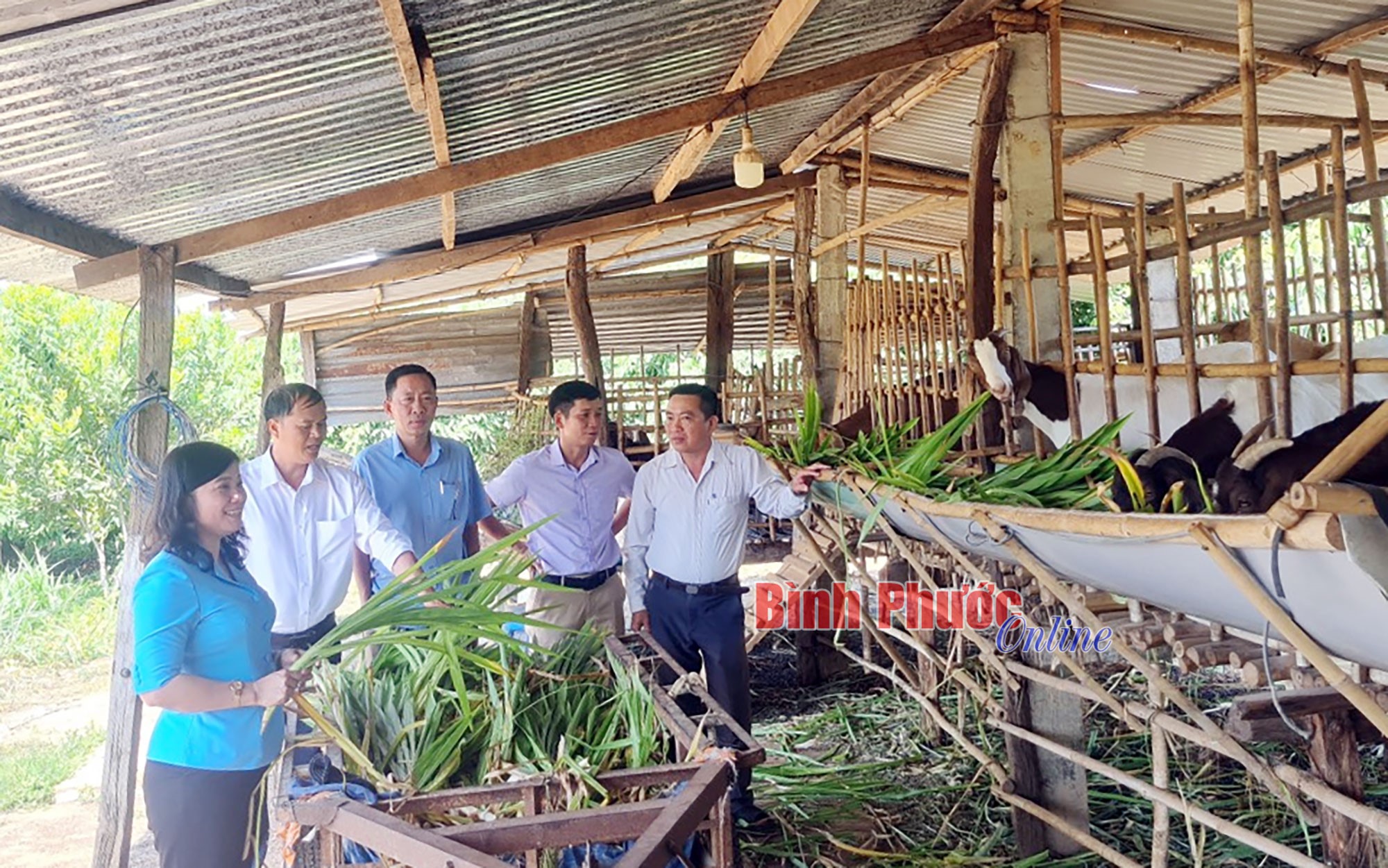(BP Portal) - Farmers in Binh Phuoc province in general and farmers in Loc Ninh district in particular have faced many difficulties in the past time in developing household agricultural economy. It results from the high input costs of livestock and farming, regularly low prices of farm produce and weak competitiveness. Faced with that situation, many farmers have applied the circular farming economic model, using crop waste and by-products as animal feed. Moreover, livestock waste is composted with probiotics to become organic fertilizer for plants, reducing input costs and increasing production value.
Reducing production costs and protecting the environment
Organic circular farming without waste is an agricultural production process that combines tradition, scientific and technical advances and management methods according to a closed cycle. Wastes, scraps and by-products of one production process are used as raw materials for other production processes to create safe and high-quality products; reduce production costs, protect the environment, improve the value and competitiveness of agricultural products, and increase producers’ income. Simply put, the circular farming economy is zero-waste agricultural production, helping farmers reduce costs and especially, improve the land.

The Loc Ninh district's regional strength is the pepper tree. However, households specializing in pepper cultivation have suffered losses due to the prolonged price drop of pepper and the continuously increasing fertilizer cost. Faced with that situation, many farmers in the district have found a new direction that is to grow pepper in combination with goat farming. Since most of goat food is available in the garden, such as acacia leaves planted as pepper pillars, grass grown around pepper gardens and many other plants, so animal feed is cheap. Besides, the manure quantity treated from goat farming is applied to the pepper garden, helping the pepper grow well and reducing investment costs.
The self-composting of organic fertilizers helps smallholder farmers reduce the cost of buying chemical fertilizers by 10-40%. Minimizing a large number of chemical fertilizers put into the soil has helped improve and make the soil more porous and reduce the harms from using chemical fertilizers, limiting the increase of pests and diseases and facilitating better plant growth. Besides the benefits obtained from organic fertilizers, the selling price of commercial goats is relatively stable, so farmers do not worry about losses.
According to Dao Xuan Phong, a pepper smallholder farmer in Can Le hamlet, Loc Thinh commune, Loc Ninh district, thanks to the available food source from pepper pillars and grass intercropped in the garden, it does not require much care and is less susceptible to diseases, so raising goats is very suitable. Furthermore, goats reproduce quickly. It begins to breed after ten months. Goats kid twice per year with 2-3 babies each time. Investment capital is quickly recovered because a goat raised for 7-8 months can reach 30-35kg.
Currently, Phong's family has a herd of 50 goats, including 20 breeding goats. On average, his family sells 15 breeding goats yearly for 5 million VND/head and more than 1,200 kg of meat goats. His annual income earned from the goats is more than 200 million VND. With an area of one hectare of pepper trees in harvest season now, he harvests 2 tons a year with an average selling price of VND 70 million/ton. As a result, his annual income reaches 140 million VND. In addition, he also uses goat manure to fertilize more than 1 hectare of longan trees. Excluding his family expenses, he earns more than 200 million VND per year. Besides Phong's family, in the Loc Ninh district, many households raise goats in combination with growing pepper, earning more than 100 million VND per year.
Building a chain of livestock breeding and cultivation
To effectively promote the circular farming economic model, farmers in many localities have started to build chain links to attract businesses to invest in sustainable organic and clean agriculture.
|
For the circular farming economic model to be effective, farmers are guided and trained in husbandry and farming knowledge... The outstanding advantage of this model is that farmers take advantage of the sources of vegetables, grass, and herbs that are grown in their garden as animal feed and increase the resistance of livestock. In addition, the source of manure, wastewater and animal waste and by-products incubated with probiotics will create high-value organic fertilizer products to fertilize crops. |
Departments, specialized units and mass organizations throughout the district have also mobilized and guided the smallholder farmers to join and establish goat-farming cooperatives. Since then, it has helped farmers feel more secure in investing in livestock breeding, creating a high and stable source of income thanks to the cooperative acting as middleman to connect the farmers and consumers. At the same time, it also attracts available local labor resources.
The circular farming economic model proves that organic and sustainable agricultural production has gradually opened up opportunities for many local farmers’ households to develop and have a long-term orientation for agriculture. This is also the policy and direction being promoted to continue restructuring the agricultural industry, moving toward sustainable and effective agricultural production./.
Author: Theo Đài PT-TH&Báo Bình Phước
Newer articles
Older articles